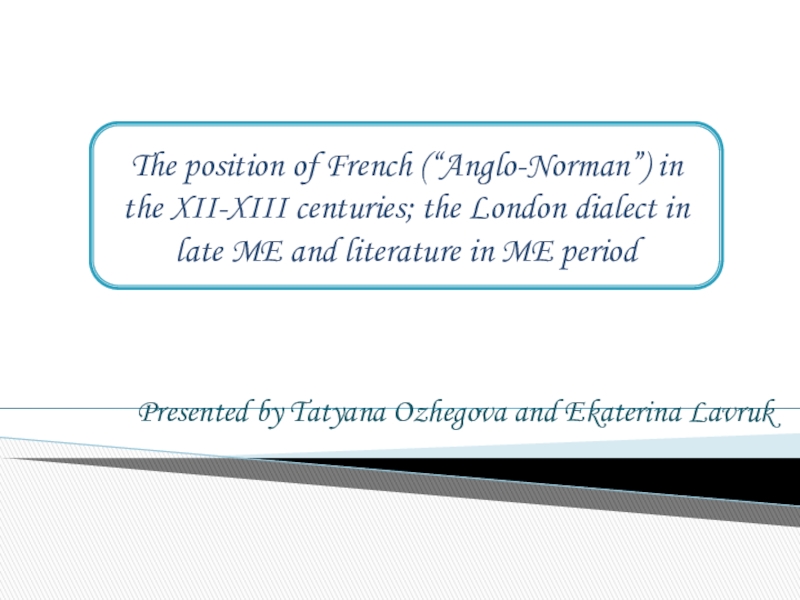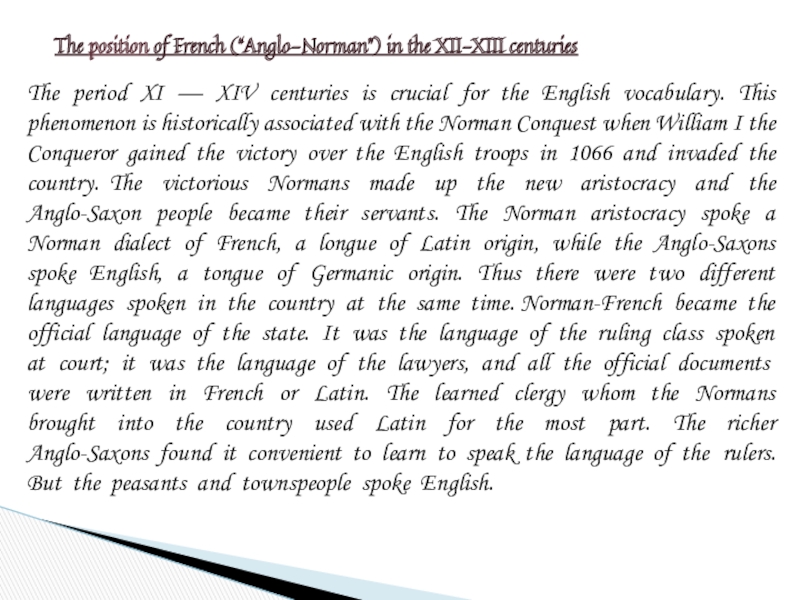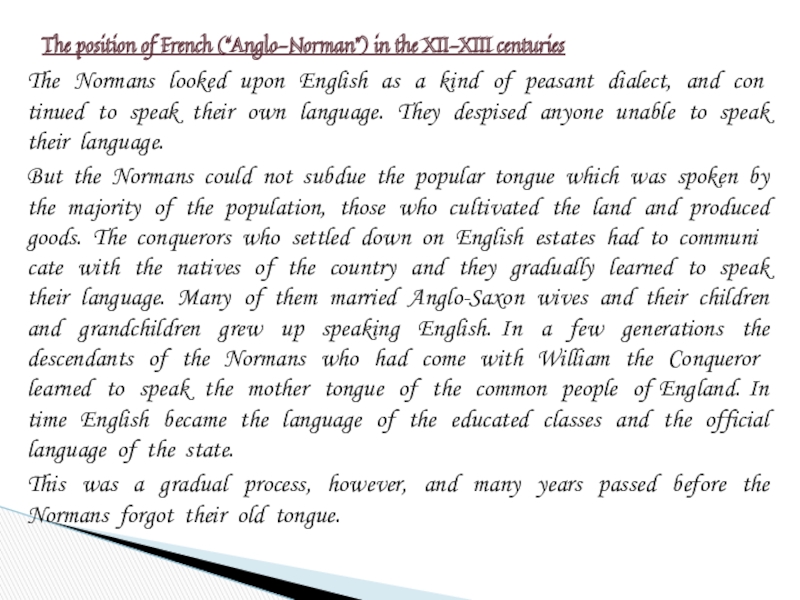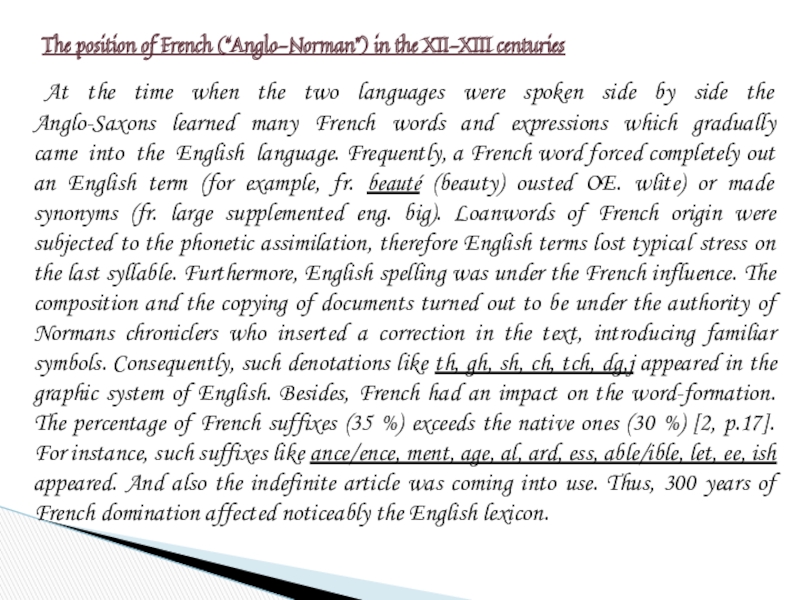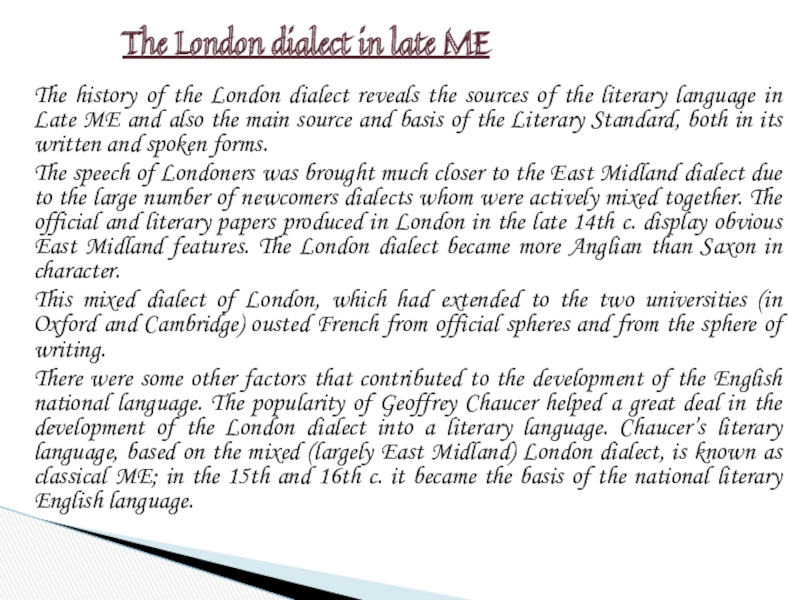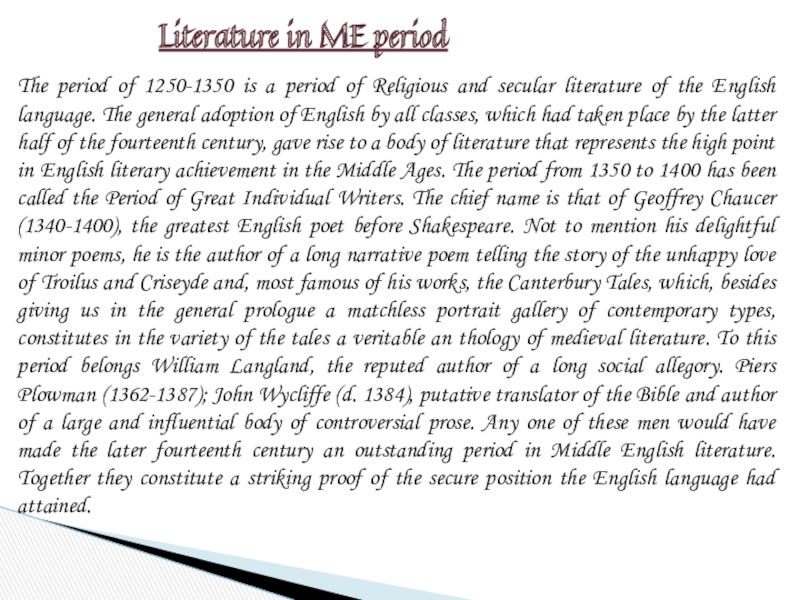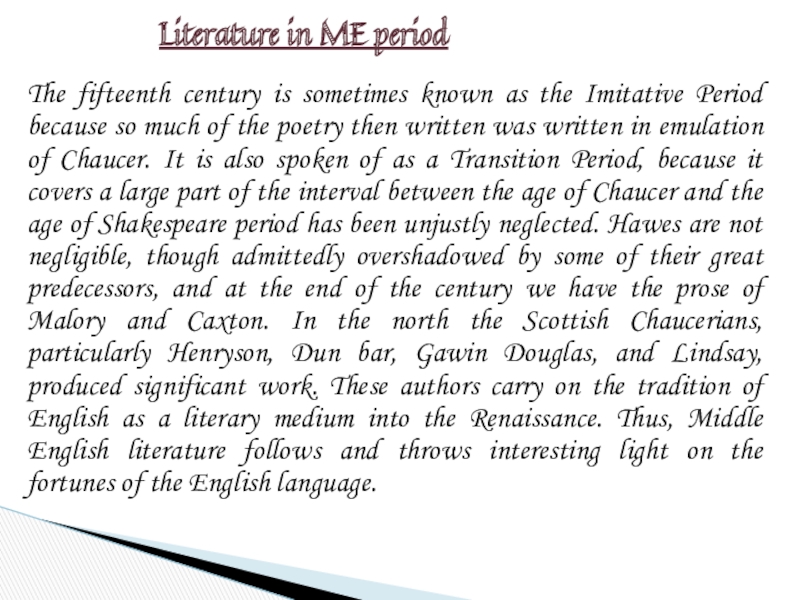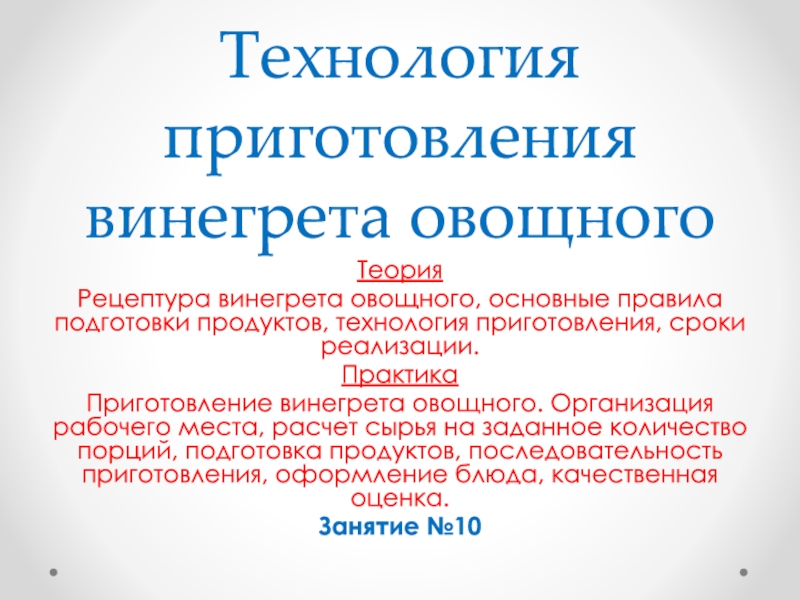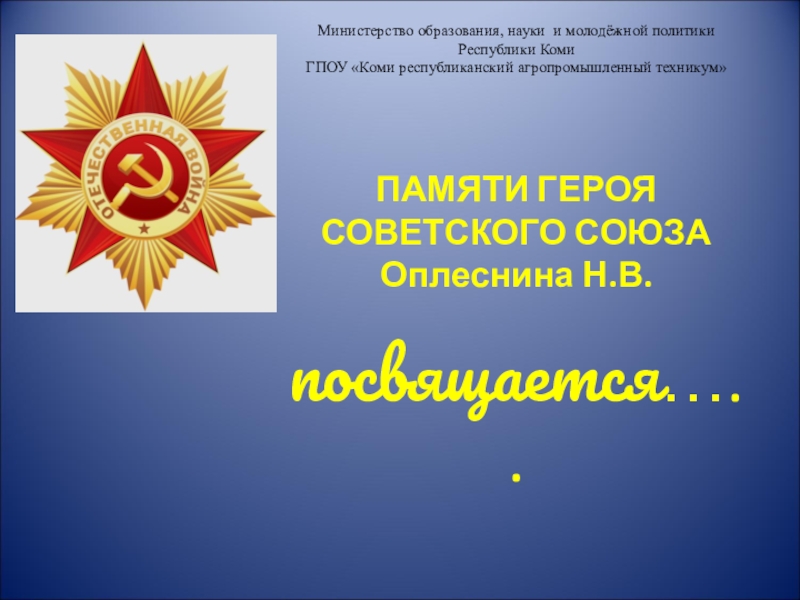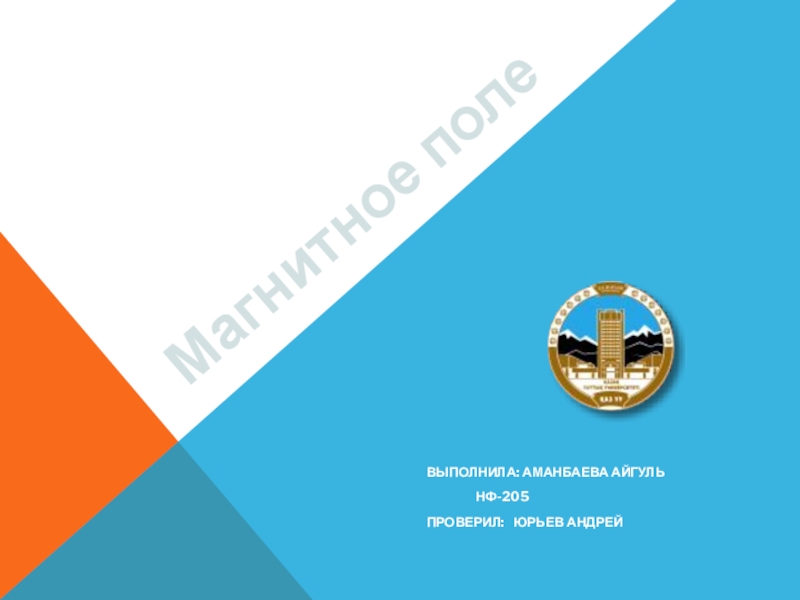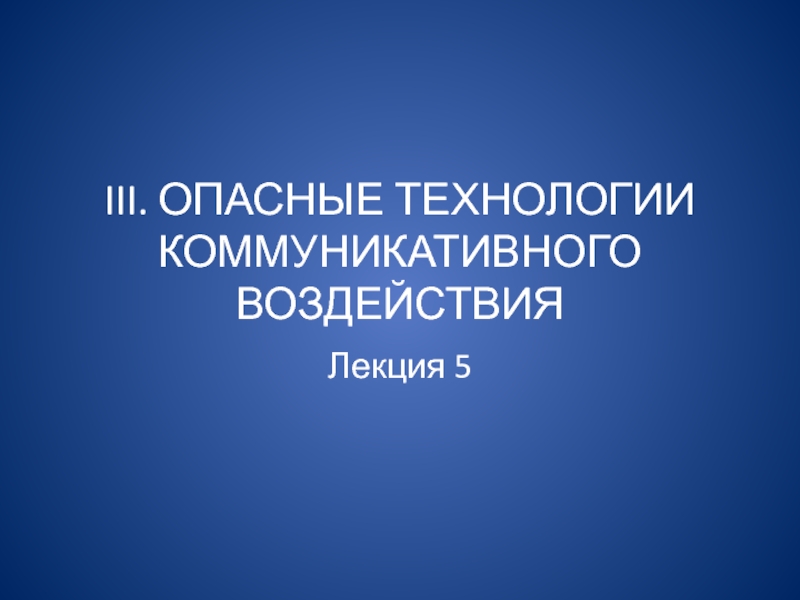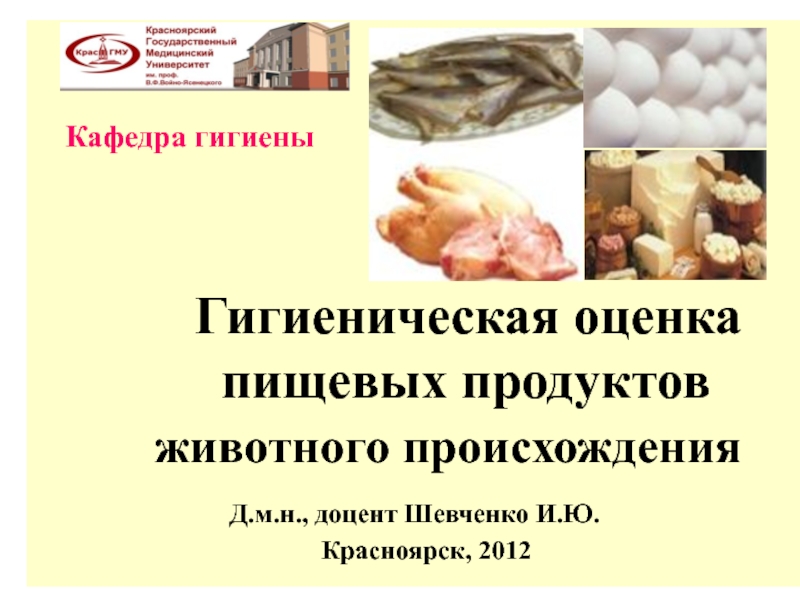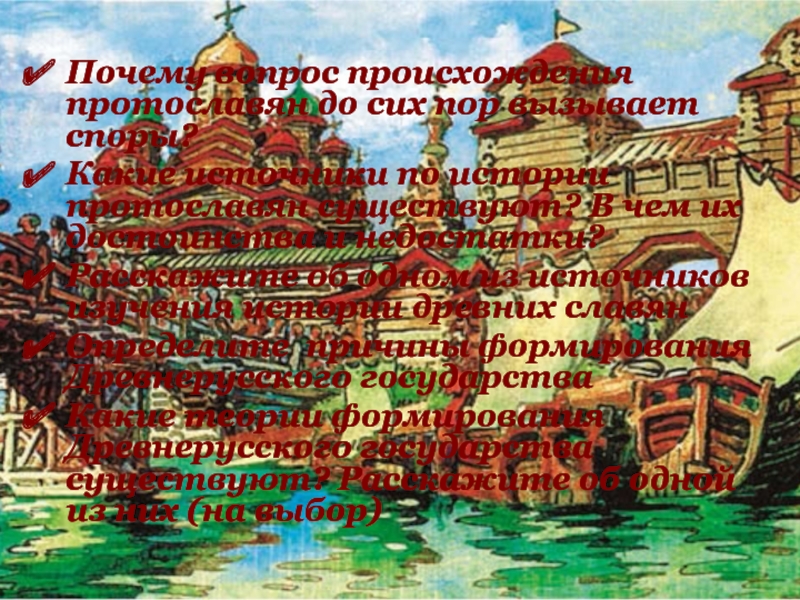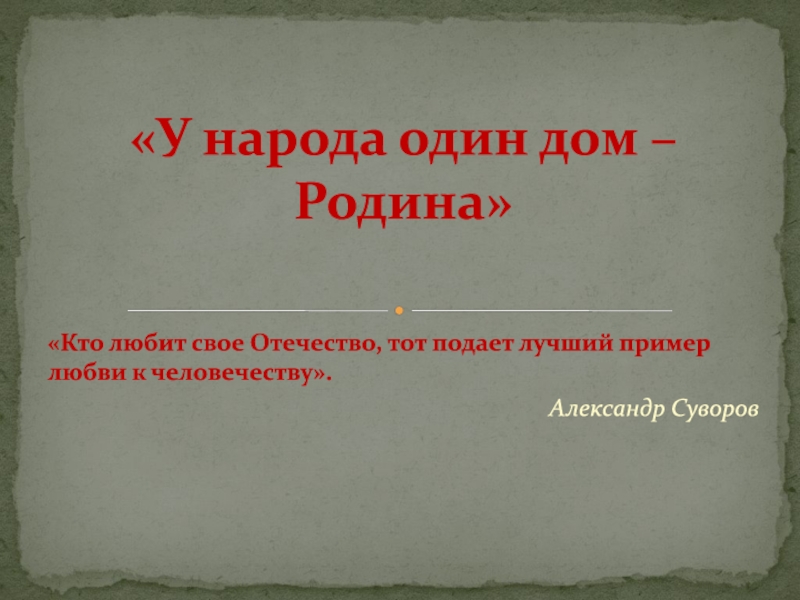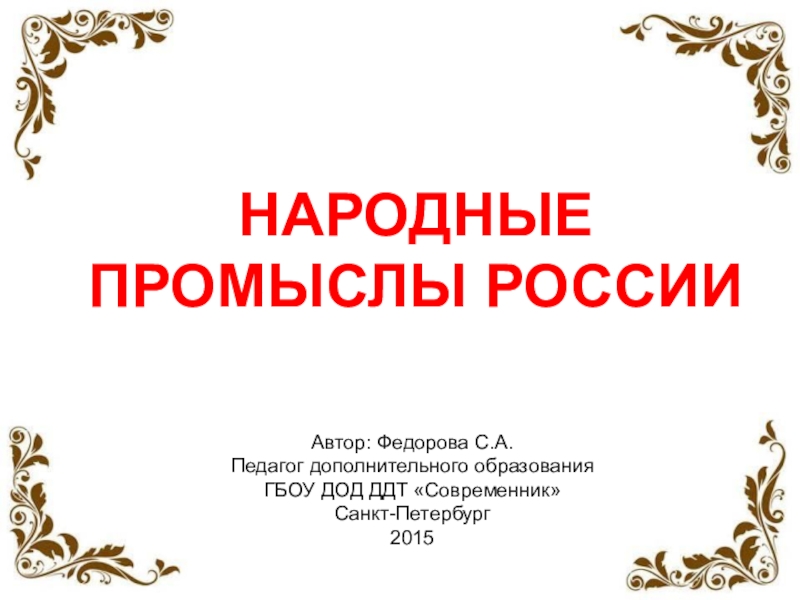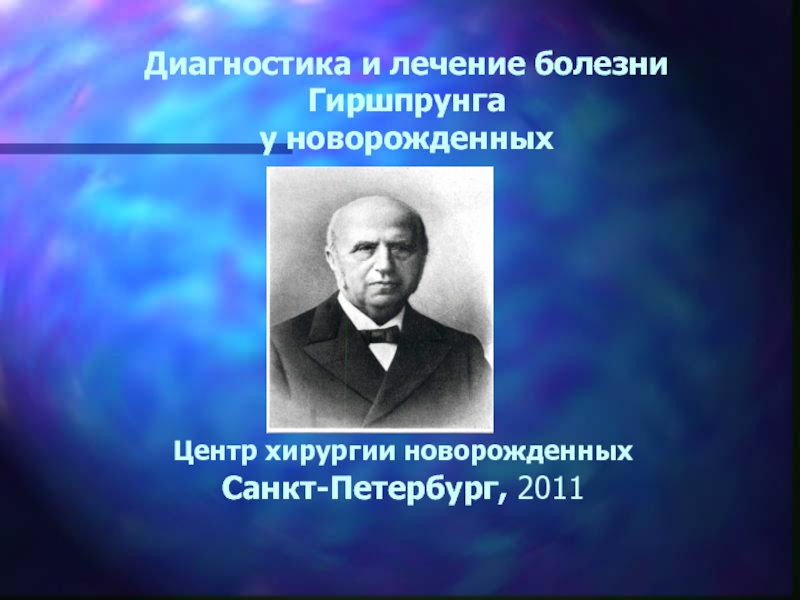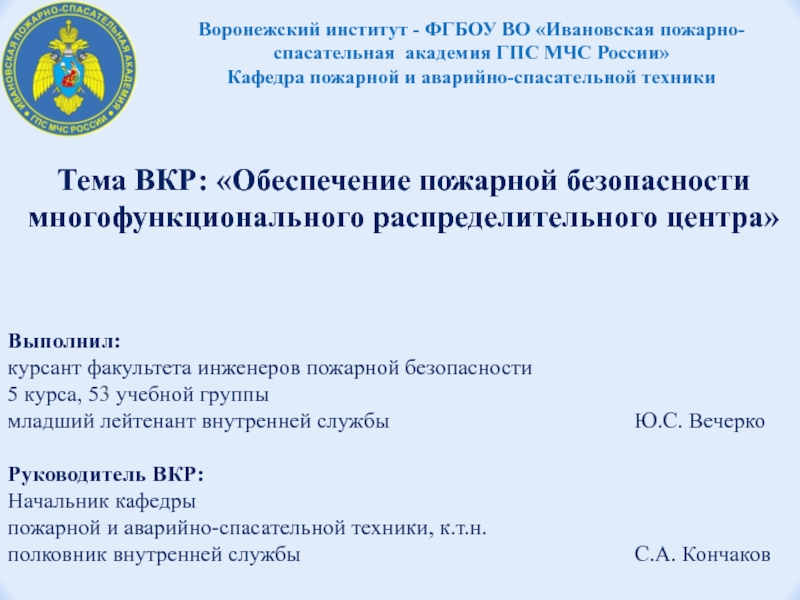Разделы презентаций
- Разное
- Английский язык
- Астрономия
- Алгебра
- Биология
- География
- Геометрия
- Детские презентации
- Информатика
- История
- Литература
- Математика
- Медицина
- Менеджмент
- Музыка
- МХК
- Немецкий язык
- ОБЖ
- Обществознание
- Окружающий мир
- Педагогика
- Русский язык
- Технология
- Физика
- Философия
- Химия
- Шаблоны, картинки для презентаций
- Экология
- Экономика
- Юриспруденция
Presented by Tatyana Ozhegova and Ekaterina Lavruk The position of French
Содержание
- 1. Presented by Tatyana Ozhegova and Ekaterina Lavruk The position of French
- 2. The period XI — XIV centuries is
- 3. The Normans looked upon English as a
- 4. At the time when the two
- 5. A group of professors from Paris founded
- 6. The history of the London dialect reveals
- 7. Of greatest linguistic consequence was the activity
- 8. The literature written I England during the
- 9. The period of 1250-1350 is a period
- 10. The fifteenth century is sometimes known as
- 11. Thank you for your attention!
- 12. Скачать презентанцию
Слайды и текст этой презентации
Слайд 2The period XI — XIV centuries is crucial for the
English vocabulary. This phenomenon is historically associated with the Norman
Conquest when William I the Conqueror gained the victory over the English troops in 1066 and invaded the country. The victorious Normans made up the new aristocracy and the Anglo-Saxon people became their servants. The Norman aristocracy spoke a Norman dialect of French, a longue of Latin origin, while the Anglo-Saxons spoke English, a tongue of Germanic origin. Thus there were two different languages spoken in the country at the same time. Norman-French became the official language of the state. It was the language of the ruling class spoken at court; it was the language of the lawyers, and all the official documents were written in French or Latin. The learned clergy whom the Normans brought into the country used Latin for the most part. The richer Anglo-Saxons found it convenient to learn to speak the language of the rulers. But the peasants and townspeople spoke English.The position of French (“Anglo-Norman”) in the XII-XIII centuries
Слайд 3The Normans looked upon English as a kind of peasant
dialect, and continued to speak their own language. They despised
anyone unable to speak their language.But the Normans could not subdue the popular tongue which was spoken by the majority of the population, those who cultivated the land and produced goods. The conquerors who settled down on English estates had to communicate with the natives of the country and they gradually learned to speak their language. Many of them married Anglo-Saxon wives and their children and grandchildren grew up speaking English. In a few generations the descendants of the Normans who had come with William the Conqueror learned to speak the mother tongue of the common people of England. In time English became the language of the educated classes and the official language of the state.
This was a gradual process, however, and many years passed before the Normans forgot their old tongue.
The position of French (“Anglo-Norman”) in the XII-XIII centuries
Слайд 4 At the time when the two languages were spoken
side by side the Anglo-Saxons learned many French words and
expressions which gradually came into the English language. Frequently, a French word forced completely out an English term (for example, fr. beauté (beauty) ousted OE. wlite) or made synonyms (fr. large supplemented eng. big). Loanwords of French origin were subjected to the phonetic assimilation, therefore English terms lost typical stress on the last syllable. Furthermore, English spelling was under the French influence. The composition and the copying of documents turned out to be under the authority of Normans chroniclers who inserted a correction in the text, introducing familiar symbols. Consequently, such denotations like th, gh, sh, ch, tch, dg,j appeared in the graphic system of English. Besides, French had an impact on the word-formation. The percentage of French suffixes (35 %) exceeds the native ones (30 %) [2, p.17]. For instance, such suffixes like ance/ence, ment, age, al, ard, ess, able/ible, let, ee, ish appeared. And also the indefinite article was coming into use. Thus, 300 years of French domination affected noticeably the English lexicon.The position of French (“Anglo-Norman”) in the XII-XIII centuries
Слайд 5A group of professors from Paris founded the first university
at Oxford. In 1209 the second university was formed at
Cambridge. The students were taught Latin, theology, medicine, grammar, rhetoric, logic, arithmetic, geometry, astronomy and music.During the Anglo-Norman period feudal culture was at its height. Tales in verse and lyrical poems appeared praising the bravery and gallantry of noble knights, their heroic deeds and chivalrous attitude towards ladies. At first they were all in Norman-French. Many of the stories came from old French sources, the language of which was a Romantic dialect, and for that reason these works were called "romances". They were brought to England by medieval poets.
William built the first castles in England. The first one was built for his family, and then he continued to build castles throughout England. Not only would they give the Norman knights a physically strong place to defend and sleep, but they were very symbolic. It was a visual reminder that the Normans were strong, and that they were to be feared.
Some interesting facts about that period
Слайд 6The history of the London dialect reveals the sources of
the literary language in Late ME and also the main
source and basis of the Literary Standard, both in its written and spoken forms.The speech of Londoners was brought much closer to the East Midland dialect due to the large number of newcomers dialects whom were actively mixed together. The official and literary papers produced in London in the late 14th c. display obvious East Midland features. The London dialect became more Anglian than Saxon in character.
This mixed dialect of London, which had extended to the two universities (in Oxford and Cambridge) ousted French from official spheres and from the sphere of writing.
There were some other factors that contributed to the development of the English national language. The popularity of Geoffrey Chaucer helped a great deal in the development of the London dialect into a literary language. Chaucer’s literary language, based on the mixed (largely East Midland) London dialect, is known as classical ME; in the 15th and 16th c. it became the basis of the national literary English language.
The London dialect in late ME
Слайд 7Of greatest linguistic consequence was the activity of John Wycliff.
His most important contribution to English prose was his translation
of the Bible completed in 1384. It was coped in manuscript and read by many people all over the country. Written in the London dialect, it played an important role in spreading this form of English.A major reason for the standardization of the London dialect was the introduction of printing by William Caxton in 1476. Caxton probably did more to standardize English in his time than any other individual, since it was expedient for him to edit the works he printed to resolve the dialect variants in order to gain the broadest readership possible for his publications. Strong dialectal traits disappeared from written works by the mid-15th c. and by the end of the 17th c. most orthographical variants had been standardized.
The London dialect in late ME
Слайд 8The literature written I England during the Middle English period
reflects fairly accurately the changes The separation of the English
nobility from France by about 1250 and the spread of English among the upper class is manifested in the next hundred years of English literature. Types of polite literature that had hitherto had appeared in French now appear in English. Of these types most popular was the romance. Only one English romance exists from an earlier date than 1250, but from this time translations and adaptations from French begin to be made, and in the course of the fourteen century their number become quite large.
Literature in ME period
Слайд 9The period of 1250-1350 is a period of Religious and
secular literature of the English language. The general adoption of
English by all classes, which had taken place by the latter half of the fourteenth century, gave rise to a body of literature that represents the high point in English literary achievement in the Middle Ages. The period from 1350 to 1400 has been called the Period of Great Individual Writers. The chief name is that of Geoffrey Chaucer (1340-1400), the greatest English poet before Shakespeare. Not to mention his delightful minor poems, he is the author of a long narrative poem telling the story of the unhappy love of Troilus and Criseyde and, most famous of his works, the Canterbury Tales, which, besides giving us in the general prologue a matchless portrait gallery of contemporary types, constitutes in the variety of the tales a veritable an thology of medieval literature. To this period belongs William Langland, the reputed author of a long social allegory. Piers Plowman (1362-1387); John Wycliffe (d. 1384), putative translator of the Bible and author of a large and influential body of controversial prose. Any one of these men would have made the later fourteenth century an outstanding period in Middle English literature. Together they constitute a striking proof of the secure position the English language had attained. Literature in ME period
Слайд 10The fifteenth century is sometimes known as the Imitative Period
because so much of the poetry then written was written
in emulation of Chaucer. It is also spoken of as a Transition Period, because it covers a large part of the interval between the age of Chaucer and the age of Shakespeare period has been unjustly neglected. Hawes are not negligible, though admittedly overshadowed by some of their great predecessors, and at the end of the century we have the prose of Malory and Caxton. In the north the Scottish Chaucerians, particularly Henryson, Dun bar, Gawin Douglas, and Lindsay, produced significant work. These authors carry on the tradition of English as a literary medium into the Renaissance. Thus, Middle English literature follows and throws interesting light on the fortunes of the English language. Literature in ME period
